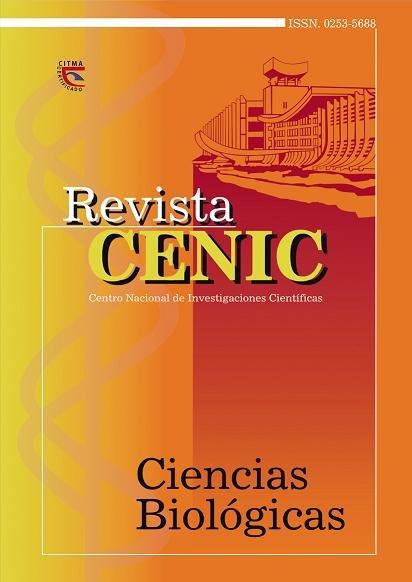Mutaciones que confieren resistencia a metronidazol y tetraciclina en Helicobacter pylori, su detección en aislados cubanos
Abstract
The bacterium Helicobacter pylori is the main agent causing gastroduodenal pathologies in humans. The
infection with this microorganism is efficaciously treated with a combination of two antibiotics and one anti-acid, although,
the appearance of strains resisting the antibiotics used in therapies, is the principal factor conducting to therapeutic
failures. In this study, PCR amplifications and sequence analysis of the entire rdxA gene and a fragment of the ARNr16S
gene were done to detect mutations involved in metronidazol and tetracycline resistance, respectively. H. pylori strains
isolated from gastric biopsies of thirty seven Cuban dyspeptic patients belonging to Centro de Investigaciones Médico
Quirúrgicas hospital were analyzed. The rdxA sequencing analysis rendered 12 strains (32.4 %) with mutations that confer
metronidazol resistance, another four strains (10.8 %) with mutations that have been associated to this resistance and
seven more (18.9 %) with stop codons, not reported before, that should also affect the RDXA protein activity, tributing to
the H. pylori resistance to this antibiotic. Consequently, the estimated metronidazol resistance value in this study is 48.6 %
(18/37) and could be increased up to 65 % (24/37) if all isolates with mutations will be added. Analysis of ARNr16S gene
fragment sequences showed only five strains with simple mutations in the AGA codon, caused by the substitution of one of
its bases, to a 13.5 % of tetracycline resistance. Taking into account, the potential high level of metronidazol resistance and
the relative small number of H. pylori strains with the potential capacity to resist tetracycline of this study, a substitution
of metronidazol by tetracycline in the H. pylori eradicating therapy used in our country should be evaluated.
Downloads

Downloads
Published
How to Cite
Issue
Section
License

This work is licensed under a Creative Commons Attribution-NonCommercial-ShareAlike 4.0 International License.
Los autores que publican en esta revista están de acuerdo con los siguientes términos:
Los autores conservan los derechos de autor y garantizan a la revista el derecho de ser la primera publicación del trabajo al igual que licenciado bajo una Creative Commons Atribución-NoComercial-CompartirIgual 4.0 Internacional que permite a otros compartir el trabajo con un reconocimiento de la autoría del trabajo y la publicación inicial en esta revista.
Los autores pueden establecer por separado acuerdos adicionales para la distribución no exclusiva de la versión de la obra publicada en la revista (por ejemplo, situarlo en un repositorio institucional o publicarlo en un libro), con un reconocimiento de su publicación inicial en esta revista.
Se permite y se anima a los autores a difundir sus trabajos electrónicamente (por ejemplo, en repositorios institucionales o en su propio sitio web) antes y durante el proceso de envío, ya que puede dar lugar a intercambios productivos, así como a una citación más temprana y mayor de los trabajos publicados (Véase The Effect of Open Access) (en inglés).














